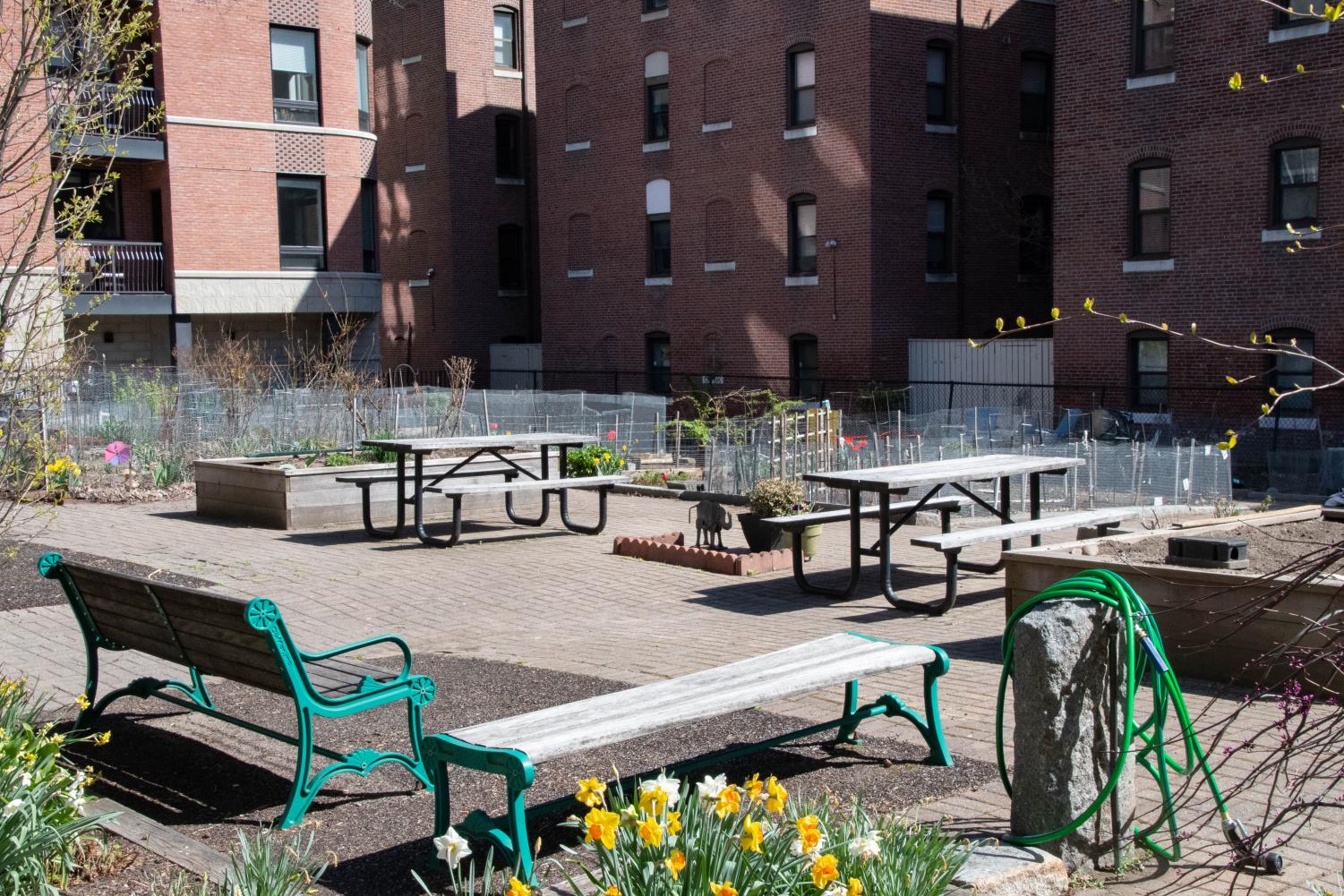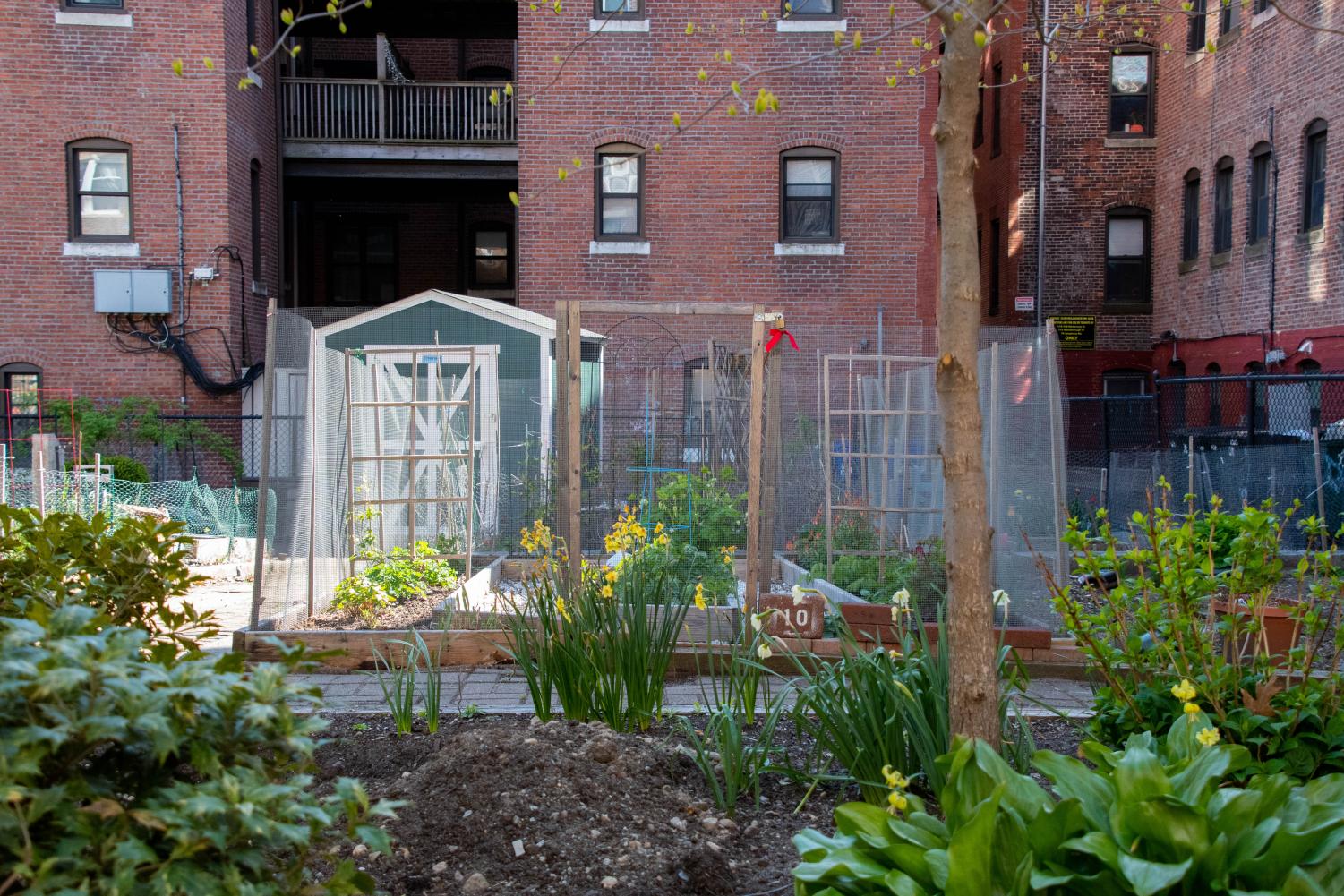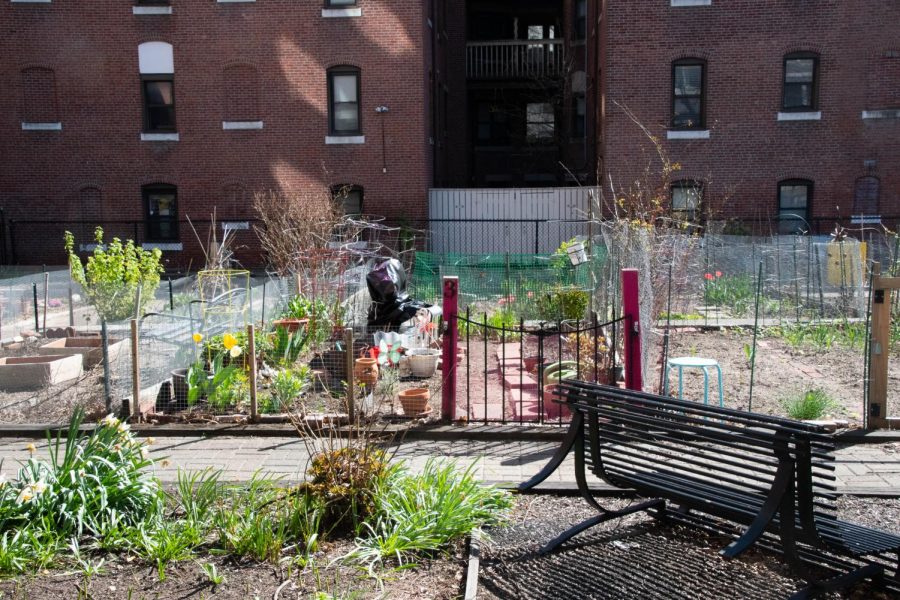City of Boston Office of Urban Agriculture amplifies community voices, prioritizes development on urban green space
A small gate with two pink posts marks plot three in the Symphony Road Community Garden. GrowBoston has worked with various community groups to create more urban green spaces in Boston neighborhoods.
May 2, 2023
On April 30, GrowBoston, the City of Boston’s Office of Urban Agriculture, began reviewing proposals regarding the future of a vacant Roxbury lot.
Located on Woodcliff Street and designated as urban green space by the city, the land parcel is now moving towards concrete development. After months of community meetings and feedback, the city is looking to transform the land into outdoor space for residents of the surrounding community.
This project is one example of the work performed by GrowBoston, a relatively new city government office. First announced in February 2022 as an expansion of the existing Grassroots Program funding initiative within the Mayor’s Office of Housing, the department illustrates a desire within city government to increase investment in urban agriculture and green space development.
GrowBoston now runs the Grassroots Program and allocates city funding to establish more open spaces across Boston neighborhoods.
“The City comes into land through tax foreclosures, [which is] either developed into housing or community farms and gardens,” said Cassidy Chang, a third-year environmental studies major currently on co-op with GrowBoston as a program coordinator. “We work with interested community groups to help … transfer ownership [of these spaces] and allow them to implement [urban agriculture].”
One such community organization is the Dudley Square Neighborhood Initiative, or DSNI, which advocates on behalf of Roxbury and North Dorchester residents. This group is heavily involved in conversations around the Woodcliff Street project and helps understand what residents would like to see done in the purchase and development of the lot.
“We stand for community control and organizing our residents to make sure that things that come through our neighborhood are not going to displace them,” said Rene Mardones, director of community organizing at the DSNI.
During the organization’s almost 40-year history, this has meant direct involvement in a number of land acquisition projects including several related to urban agriculture, Mardones said.
“We own two urban farms in the Dudley area … and a 10,000 square foot greenhouse. The idea is that community members can participate,” Mardones said. “We run the planning process to get community input and provide that to the City of Boston.”
In addition to Woodcliff Street, the DSNI and GrowBoston are currently collaborating on another urban greenspace development initiative focusing on a different Roxbury parcel, this one located on Bird Street.
This close cooperation with the DSNI and other similar organizations demonstrates the high level of focus GrowBoston’s staff maintains on the people closest to their projects, according to Chang.
“Our work involves a lot of community meetings to understand what residents think,” Chang said. “Whatever the community wants sort of goes, we try to find the best way to direct them.”
James Hearsum, executive director of the Massachusetts Horticultural Society, said this human interaction piece is what makes for truly successful agricultural development. He has spent his career working on a number of similar initiatives around the world, including a topographical preservation effort in Jordan.
“To make change, you have to work with people, you have to engage with [the] community. But horticulture also has this individual power to change lives,” Hearsum said. “It goes both ways.”

Providing and maintaining urban agricultural spaces for vulnerable urban populations, like many of the individuals and families who have historically lived in the Dudley Square area, can have positive impacts, Mardones said.
“I was talking to one of the residents who is part of [our] greenhouse grower program. She said, ‘You go to a supermarket and everything is so expensive. Growing some vegetables definitely helps me save some money,’” Mardones said. “This woman with a fixed income, probably in her 70s, is benefiting from this space that is open for the community.”
Hearsum said he had a similar interaction which demonstrated the power of accessible open areas and agricultural learning for urban residents.
“In Chicago in 2008 … a 19-year-old who had been in and out of incarceration … stood at the front of a big church after a service, held up this carrot, and said ‘I grew this carrot and I did it myself.’ He [had] signed onto this program where they had a botanical farm, learned how to sow carrot seeds. He said, ‘This is the first thing I have done in my life that is good.’ It was incredible,” Hearsum said.
The Massachusetts Horticultural Society is highly focused on the education component of urban agriculture, Hearsum said. It works throughout the state to provide information on the U.S. food system, especially the production of produce, to a population largely disconnected from it.
GrowBoston staff recognized the importance of education in raising awareness about many of these topics and in allowing them to continue their work.
“It’s been very hard to get into this space in Boston. I’m happy to be doing what I can to share my knowledge,” Chang said.
While the four-person department lacks the resources to sponsor their own programs, they have compiled separate lists of garden learning opportunities and urban growing spaces on their website open to local participation.

There are, however, reasons to be wary of the recent attention the City of Boston has given to issues of green space development and urban agriculture, according to Hearsum.
“It’s fantastic to see [horticulture] in the political agenda but I think there can be a danger to that. We don’t want the issue to be politicized. We want there to be access for every area and for every community,” Hearsum said.
He added that his concerns stem from previous observations of governing bodies, specifically the ways in which they often direct funding.
“When money comes from the government, there tends to be strings attached, all these other things you need to do with it,” Hearsum said.
Still, Chang and GrowBoston staff expressed optimism surrounding their work and for the future.
“Coming from the idea that city governments don’t do anything, this [community-focused] attitude is really cool to see, especially with the exploitative history that Boston’s city government has around residential issues and zoning,” Chang said. “Everyone in my department is very aware of this past narrative and wants to work to do better.”







